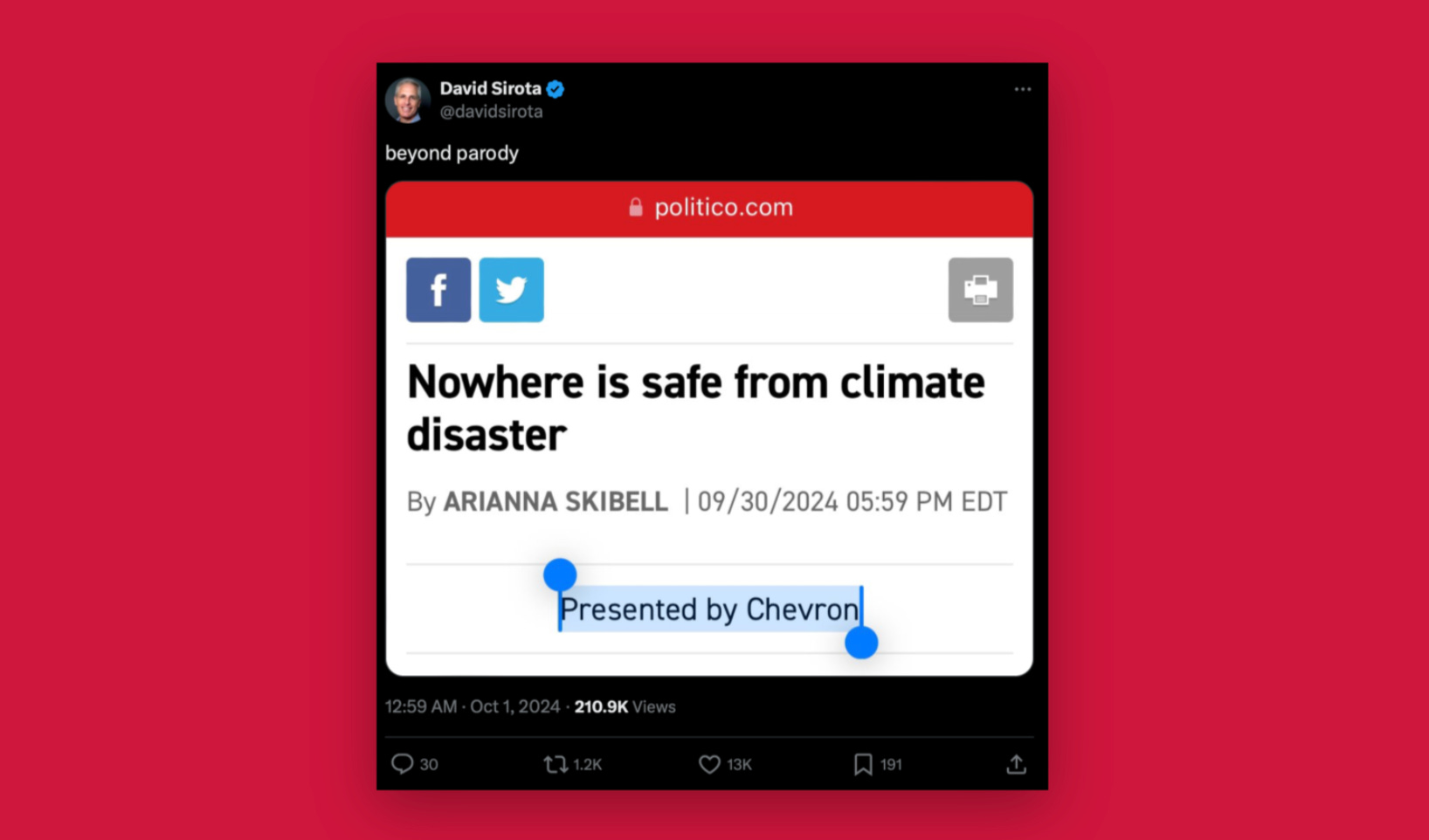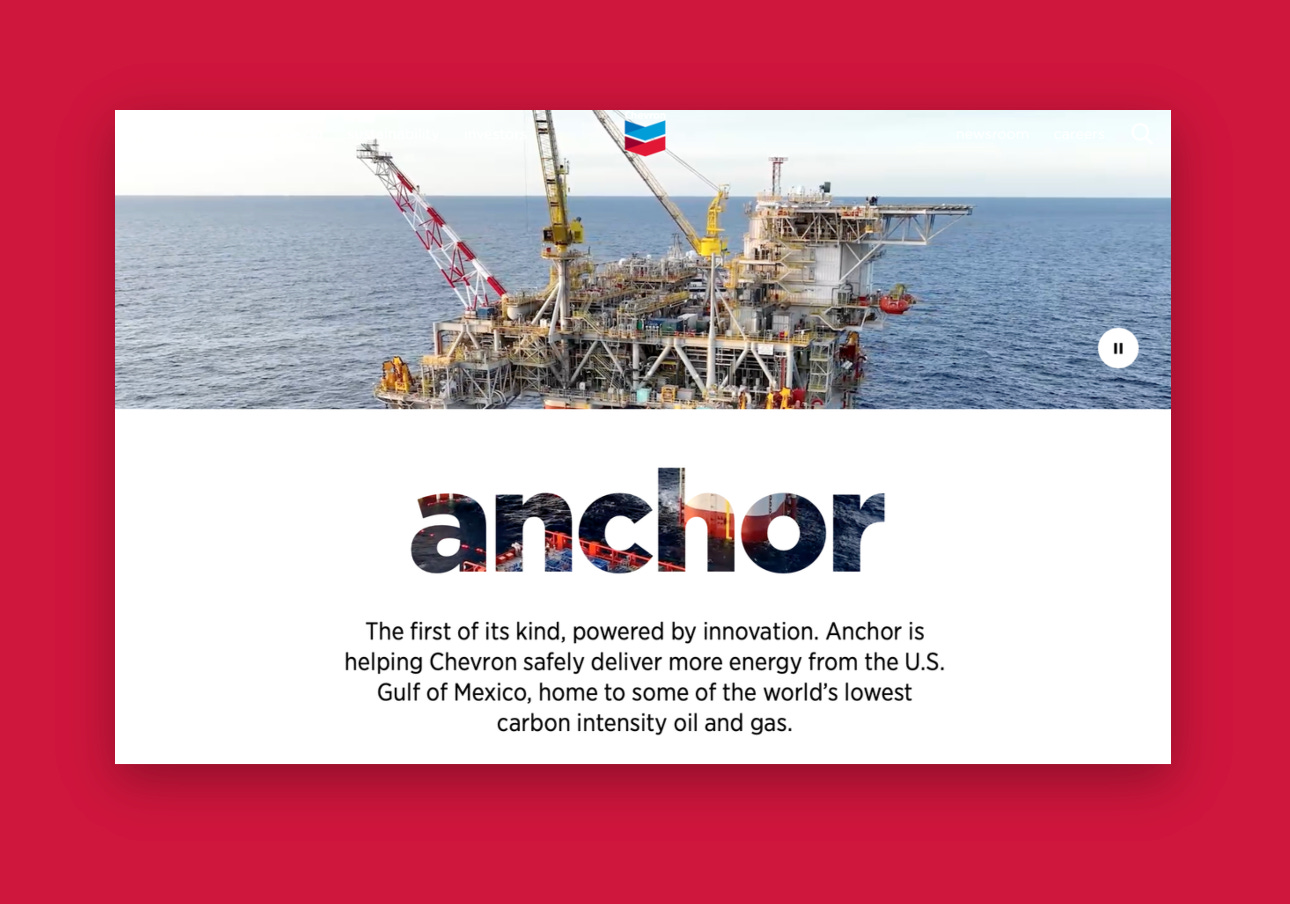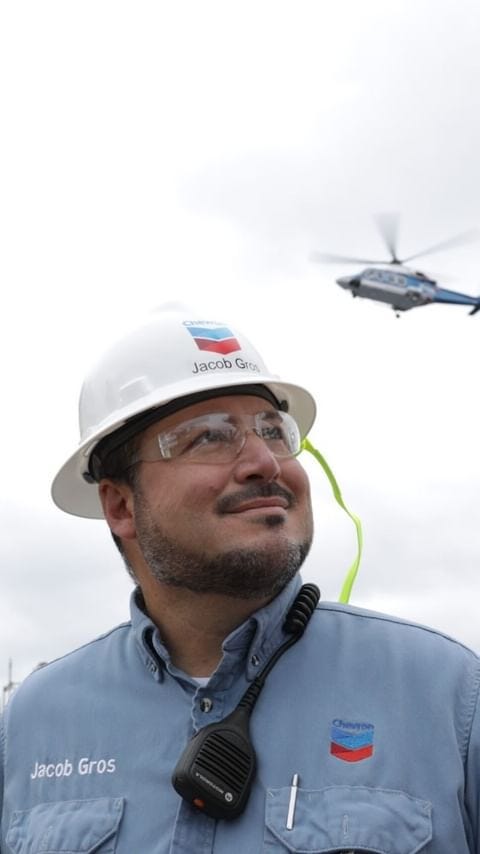Why Chevron is sponsoring Hurricane Helene journalism
Hey there—Emily here. Today’s article by Arielle shines the first-ever light on a new greenwashing campaign from Chevron, which the oil giant is brazenly plastering on articles about Hurricane Helene. Either way, we love you! And if you’d rather, here is a curated list of Hurricane Helene mutual aid resources. Why Chevron is sponsoring Hurricane Helene journalismThe oil giant wants to convince the public that its new ultra-high-pressure offshore drilling project, Anchor, is climate-friendly.
For a list of Hurricane Helene mutual aid resources, click here. One day after Hurricane Helene dissipated, the Politico newsletter Power Switch ran a story detailing the terrifying nationwide implications of fossil-fueled storms. What followed was a back-and-forth between Politico’s reporters and Chevron’s marketing team. For a few paragraphs, readers were given journalism about Helene’s astronomical human and economic toll. Then, they were given a break for a paid message about Chevron’s new “Anchor” project—an ultra-deepwater drilling endeavor that the oil giant claims will deliver “some of the world’s lowest carbon intensity oil and gas.
Chevron’s sponsorship in Politico was perhaps its most dystopian example of climate-focused advertising about the Anchor project in recent weeks, but it was far from the only one. During Climate Week NYC—the annual event that brings together diplomats, politicians, activists and corporate leaders to talk climate solutions—Chevron placed Anchor ads in The New York Times, NPR, and sponsored the Axios climate newsletter. It also advertised Anchor across social media. But what is the Anchor project, exactly, and why is Chevron marketing it to climate-focused audiences? The $5.7 billion facility, located 140 miles off the coast of Louisiana, is the first time an oil company has cracked the code on how to drill in previously untouched, dangerously high pressure deep sea environments. The technological achievement, which took Chevron a decade, will allow the fossil fuel industry to reach underwater oil and gas fields up to 20,000 pounds per square inch pressures, a third greater than any prior well. Chevron estimates that Anchor could produce up to 440 million barrels of oil over 30 years, roughly equal to 187 million metric tons of carbon dioxide, or the same amount of emissions as running 499 methane gas plants in one year. But those millions of barrels are only the beginning of the company’s ambition; Chevron hopes Anchor will pioneer a new type of oil production that could yield billions of gallons of oil and gas from ultra-high-pressure fields across the world. Chevron’s ambition, however, is coming amid global calls for a massive societal transition away from fossil fuels. Scientists say such a transition is the only way to solve the worsening climate crisis, which is wreaking havoc on human health and the economy. “Lower carbon” oil and gasEven before the first barrel of oil was produced from Anchor on August 12, Chevron had spent at least $400,000 placing ads about it on social media and traditional news media, according to a HEATED analysis of data from ad insights firm Media Radar. The amount is almost certainly an underestimation: Many of the Anchor ads currently on social media, podcasts, and other media outlets were not included in Media Radar’s data. A closer estimation may be the nearly $7 million the company has spent on ad placements over the past three months—outspending competitors like Shell and ExxonMobil by at least 50 percent. The Anchor project media blitz, which has included press releases and interviews with executives, often claims that ultra-high-pressure deepwater fossil fuel projects are better for the planet than other fossil fuel projects. “The Anchor project provides…lower carbon intensity oil and natural gas to help meet energy demand,” said Bruce Niemeyer, president of Chevron’s U.S. oil exploration and production, in a press release. The claim rests in part on a simple fact: The Anchor project no longer uses diesel-powered rigs and fracking equipment, but uses electric-powered drilling rigs and fracking equipment instead. “To reduce carbon emissions, the Anchor FPU was designed as an all-electric facility with electric motors and electronic controls,” its website reads. The oil giant also touts its re-use of waste heat and captured vapor to move oil and gas through existing pipelines, rather than constructing new ones. Greenwashing experts told HEATED that these claims amount to paltering: they may be technically true, but purposefully obscure a larger picture. Yes, using electric rigs may make it less carbon-intensive to produce a barrel of oil. But since Chevron intends to use the new technology to produce even more oil and gas, any reductions would likely be offset, and Chevron would pollute even more than it does today. (The company is already one of the world’s biggest polluters, accounting for 3 percent of historic global greenhouse gas emissions). “You can bring [the carbon intensity] down by a minuscule amount and still make that claim that it's cleaner than before,” said Wren Montgomery, an associate professor of sustainability at Western University in Ontario, Canada. “But they're trying to increase production. So overall, they're not actually reducing their carbon footprint even if they have made some small reduction per barrel.” Chevron isn’t making these claims in isolation; other fossil fuel companies like BP and Exxon are also using bogus carbon-intensity marketing to justify increased production, while claiming to be tackling climate change. But Montgomery says that Chevron’s ads, which simultaneously hype its new oil production while claiming that oil is better for the planet, are a sign of an industry hanging on by its fingernails as renewable energy continues to be cheaper than coal and gas. “I see a lot of these as sort of grasping at straws,” she said. Fossil fuel companies are “driving for new audiences that will support them…so they can keep operating a little bit longer and not be shut down, which we all know is what needs to happen.” The new frontier of deepwater drillingChevron’s “lower carbon” claims aren’t the only concern experts have with the Anchor project. Indeed, some say the entire new field of ultra-high-pressure drilling poses massive environmental risk. All of Chevron’s ads take care to describe the Anchor project as “safe,” a claim backed up by the Bureau of Ocean Energy Management’s environmental assessment. The BOEM concluded that offshore spills “are possible if an accident were to damage a storage tank onboard the offshore support vessels,” but said the agency’s oversight and Chevron’s safety precautions make it “reasonable to conclude that an accidental spill event is not likely to occur.” But overshadowing any deepwater drilling project is the infamous rig that caused one of the worst marine oil spills in history: Deepwater Horizon. Before Deepwater Horizon became synonymous with disaster, killing 11 people and releasing about 300 Olympic-swimming pools-worth of crude oil into the Gulf of Mexico, it successfully drilled the deepest oil and gas well at the time. Three years before it exploded, Deepwater Horizon was described as “one of the most powerful rigs in the world.” Chevron’s Anchor project is drilling at pressures a third higher than Deepwater Horizon, where the margins for error are smaller. But for Big Oil, the reward is worth the risk because deeper wells produce more oil and gas. Anchor’s seven deepsea wells sit 34,000 feet below sea level, where temperatures can hit 121 degrees Celsius and the pressure can reach up to 20,000 pounds per square inch. That subsurface pressure “is essentially equivalent to an elephant standing on a quarter,” Chevron CEO Mike Wirth told CNBC. The ultra-high-pressure technology is “a breakthrough for the energy industry” that “allows us to unlock previously difficult-to-access resources,” said Nigel Hearne, Chevron’s executive vice president, in a press release. If successful, energy industry analysts told Reuters that the Anchor project could open the door to developing ultra-high pressure, deepwater oil fields around the world, including off the coasts of Brazil, Angola, and Nigeria. Access to new oil fields could also push the Gulf of Mexico’s fossil fuel production above its previous record output of 2019, according to the same analysts. Altogether, the Anchor project’s technology could help tap more than 5 billion barrels of oil and gas globally. That’s roughly equivalent to a whopping 2 billion metric tons of carbon emissions, an amount so large that it is about equal to the emissions from all of South America and Africa, combined. To say this new fossil fuel frontier is a significant threat to a livable climate is an understatement. The International Energy Agency warned in 2021 that all new fossil fuel developments must stop if the world wants to prevent the worst effects of climate change. “There’s no way to make offshore drilling safe, and especially not projects like this one that involve drilling at such depths and under such high pressure,” said Kristen Monsell, oceans legal director and senior attorney at the Center for Biological Diversity, who sharply criticized the BOEM’s assessment. “And the further offshore oil and gas activities occur, the more difficult oil spill or other responses are, as the Deepwater Horizon disaster highlights all too well.” The probability of a serious accident or explosion increases by 8.5 percent with each additional 100 feet of depth at which an offshore platform operates, according to a peer-reviewed analysis of fossil fuel production in the Gulf of Mexico. Offshore drilling also represents a risk to critically endangered species like Rice’s whales, and endangered Kemp’s ridley sea turtles. “The project would also lock in decades of fossil fueled climate destruction from oil that should most definitely stay in the ground,” Monsell pointed out. “We need to be phasing drilling out of our oceans, not allowing oil companies to take drilling to risky new lows.” Further reading:
Catch of the day: Captain is a gentle boy who was rescued just over a year ago by reader Molly. His favorite place is Molly’s lap, though he also likes to sit on her shoulders to keep her company while she’s working from home. This fall-colored kitty also loves belly rubs and napping in the sun. Want to see your furry (or non-furry!) friend in HEATED? Send a picture and some words to catchoftheday@heated.world. Invite your friends and earn rewardsIf you enjoy HEATED, share it with your friends and earn rewards when they subscribe. |
Older messages
JD Vance’s cowardly climate denial
Wednesday, October 2, 2024
Amid unprecedented destruction from Helene, Vance was too afraid to tell Americans what he actually believes. ͏ ͏ ͏ ͏ ͏ ͏ ͏ ͏ ͏ ͏ ͏ ͏ ͏ ͏ ͏ ͏ ͏ ͏ ͏ ͏ ͏ ͏ ͏ ͏ ͏ ͏ ͏ ͏ ͏ ͏ ͏ ͏ ͏ ͏ ͏ ͏ ͏ ͏ ͏ ͏ ͏ ͏ ͏ ͏ ͏ ͏
California is HEATED
Friday, September 27, 2024
Exciting news! Our exclusive reporting on plastic industry greenwashing is cited in the state's historic new lawsuit against Exxon. ͏ ͏ ͏ ͏ ͏ ͏ ͏ ͏ ͏ ͏ ͏ ͏ ͏ ͏ ͏ ͏ ͏ ͏ ͏ ͏ ͏ ͏ ͏ ͏ ͏ ͏ ͏ ͏ ͏ ͏ ͏ ͏ ͏
Why are Republicans so obsessed with refrigerators?
Monday, September 23, 2024
The seemingly weird plan in Project 2025 is merely a new page of a familiar fossil fuel playbook. ͏ ͏ ͏ ͏ ͏ ͏ ͏ ͏ ͏ ͏ ͏ ͏ ͏ ͏ ͏ ͏ ͏ ͏ ͏ ͏ ͏ ͏ ͏ ͏ ͏ ͏ ͏ ͏ ͏ ͏ ͏ ͏ ͏ ͏ ͏ ͏ ͏ ͏ ͏ ͏ ͏ ͏ ͏ ͏ ͏ ͏ ͏ ͏ ͏ ͏ ͏ ͏
MAGA's scariest environmental proposal
Tuesday, September 17, 2024
The blueprint for Trump's second term envisions deregulating ubiquitous and carcinogenic “forever” chemicals. ͏ ͏ ͏ ͏ ͏ ͏ ͏ ͏ ͏ ͏ ͏ ͏ ͏ ͏ ͏ ͏ ͏ ͏ ͏ ͏ ͏ ͏ ͏ ͏ ͏ ͏ ͏ ͏ ͏ ͏ ͏ ͏ ͏ ͏ ͏ ͏ ͏ ͏ ͏ ͏ ͏ ͏ ͏ ͏
Everyone's heads are in the sand
Thursday, September 12, 2024
Tuesday's debate was a disappointing illustration of ignorance about the stakes and science of climate change. ͏ ͏ ͏ ͏ ͏ ͏ ͏ ͏ ͏ ͏ ͏ ͏ ͏ ͏ ͏ ͏ ͏ ͏ ͏ ͏ ͏ ͏ ͏ ͏ ͏ ͏ ͏ ͏ ͏ ͏ ͏ ͏ ͏ ͏ ͏ ͏ ͏ ͏ ͏ ͏ ͏ ͏ ͏
You Might Also Like
Win Two Tickets To A Major Music Festival & A Shopping Spree!
Thursday, February 27, 2025
Thanks To Marshalls. Feb. 27, 2025 Bustle Daily Enter To Win Tickets To A Major Music Festival, Thanks To Marshalls Presented by Marshalls Enter To Win Tickets To A Major Music Festival, Thanks To
Cat Story
Thursday, February 27, 2025
How we got that cat ͏ ͏ ͏ ͏ ͏ ͏ ͏ ͏ ͏ ͏ ͏ ͏ ͏ ͏ ͏ ͏ ͏ ͏ ͏ ͏ ͏ ͏ ͏ ͏ ͏ ͏ ͏ ͏ ͏ ͏ ͏ ͏ ͏ ͏ ͏ ͏ ͏ ͏ ͏ ͏ ͏ ͏ ͏ ͏ ͏ ͏ ͏ ͏ ͏ ͏ ͏ ͏ ͏ ͏ ͏ ͏ ͏ ͏ ͏ ͏ ͏ ͏ ͏ ͏ ͏ ͏ ͏ ͏ ͏ ͏ ͏ ͏ ͏ ͏ ͏ ͏ ͏ ͏ ͏ ͏ ͏ ͏ ͏ ͏ ͏ ͏ ͏ ͏ ͏ ͏ ͏
Selena Gomez Just Won The Red Carpet At The 2025 BAFTAs In An Iconic Gown
Thursday, February 27, 2025
WOW. The Zoe Report Daily The Zoe Report 2.16.2025 Selena Gomez Won The Red Carpet At The 2025 BAFTAs In An Iconic Gown (Red Carpet) Selena Gomez Won The Red Carpet At The 2025 BAFTAs In An Iconic Gown
"European" Means "I Want To Walk"
Thursday, February 27, 2025
When we mistake concrete ideas for abstract ones ͏ ͏ ͏ ͏ ͏ ͏ ͏ ͏ ͏ ͏ ͏ ͏ ͏ ͏ ͏ ͏ ͏ ͏ ͏ ͏ ͏ ͏ ͏ ͏ ͏ ͏ ͏ ͏ ͏ ͏ ͏ ͏ ͏ ͏ ͏ ͏ ͏ ͏ ͏ ͏ ͏ ͏ ͏ ͏ ͏ ͏ ͏ ͏ ͏ ͏ ͏ ͏ ͏ ͏ ͏ ͏ ͏ ͏ ͏ ͏ ͏ ͏ ͏ ͏ ͏ ͏ ͏ ͏ ͏ ͏ ͏ ͏ ͏ ͏ ͏ ͏
Sketched Buk Brings the Brilliance of Gold to Bangkok
Thursday, February 27, 2025
Thailand's Buk overcomes challenges to make glass gilding an important part of his design practice. BLAG Magazine: Adventures in Sign Painting Craft, Community & Culture Sketched Buk Brings the
Have You Seen the Panda Cam? 🐼
Thursday, February 27, 2025
— Check out what we Skimm'd for you today February 17, 2025 Subscribe Read in browser Header Image But first: the best Presidents Day sales to shop today Update location or View forecast
“The Lord is American” by W. J. Lofton
Thursday, February 27, 2025
The world undresses / its wounds. It wounds. ͏ ͏ ͏ ͏ ͏ ͏ ͏ ͏ ͏ ͏ ͏ ͏ ͏ ͏ ͏ ͏ ͏ ͏ ͏ ͏ ͏ ͏ ͏ ͏ ͏ ͏ ͏ ͏ ͏ ͏ ͏ ͏ ͏ ͏ ͏ ͏ ͏ ͏ ͏
Jeff Bezos Makes a Damning Case Against Corporate Media
Thursday, February 27, 2025
The decision to exile dissenting views from the Post opinion pages shows he puts Amazon's business over journalism ͏ ͏ ͏ ͏ ͏ ͏ ͏ ͏ ͏ ͏ ͏ ͏ ͏ ͏ ͏ ͏ ͏ ͏ ͏ ͏ ͏ ͏ ͏ ͏ ͏ ͏ ͏ ͏ ͏ ͏ ͏ ͏ ͏ ͏ ͏ ͏ ͏ ͏ ͏ ͏ ͏
Fit Is Better Than Thin
Thursday, February 27, 2025
The fit versus fat debate, cold plunging, new tech and your recommendations. ͏ ͏ ͏ ͏ ͏ ͏ ͏ ͏ ͏ ͏ ͏ ͏ ͏ ͏ ͏ ͏ ͏ ͏ ͏ ͏ ͏ ͏ ͏ ͏ ͏ ͏ ͏ ͏ ͏ ͏ ͏ ͏ ͏ ͏ ͏ ͏ ͏ ͏ ͏ ͏ ͏ ͏ ͏ ͏ ͏ ͏ ͏ ͏ ͏ ͏ ͏ ͏ ͏ ͏ ͏ ͏ ͏ ͏ ͏ ͏ ͏ ͏
Why Does The Bad Guy Feel Like The Victim?
Thursday, February 27, 2025
Thoughts on the psychology of sympathizing with petty wrongdoers ͏ ͏ ͏ ͏ ͏ ͏ ͏ ͏ ͏ ͏ ͏ ͏ ͏ ͏ ͏ ͏ ͏ ͏ ͏ ͏ ͏ ͏ ͏ ͏ ͏ ͏ ͏ ͏ ͏ ͏ ͏ ͏ ͏ ͏ ͏ ͏ ͏ ͏ ͏ ͏ ͏ ͏ ͏ ͏ ͏ ͏ ͏ ͏ ͏ ͏ ͏ ͏ ͏ ͏ ͏ ͏ ͏ ͏ ͏ ͏ ͏ ͏ ͏ ͏ ͏ ͏ ͏ ͏





